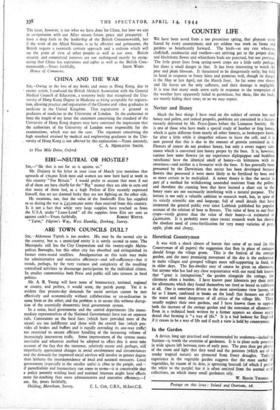COUNTRY LIFE.
WE have been saved from a too precocious spring, that pleasant event feared by every countryman; and yet seldom was work on farms and gardens so beneficently forward. The birds—at any rate wheatear, chiffchaff, sancirnartin and swallow—are arriving pat to the proper date; and blackthorn flower and whitethorn buds are punctual, but not previous The little green lines front spring-sown crops are a little early perhap,, but there is small danger in that. It has been interesting to watch the pear and plum blossom. It threatened to be dangerously early; but hell its hand in response to frosty hints and promises well, though its danger is the May or late April, not the March frost. So far some rose shoot, and lily leaves are the only sufferers, and their damage is negligible. It is true that many seeds sown early in response to the temptation of the weather have apparently failed to germinate, but these, like the bud,, are merely biding their time; or so we may expect.
Nectar and Honey
Much the best things I have read on the subject of certain bee and honey and pollen, and indeed propolis, problems are contained in a lecture recently delivered by Mr. Pryce-Jones before the Lirmaean Society. He is one of those who have made a special study of heather or ling honey, which is quite different from nearly all other honeys, as beekeepers know, for after a little while it altogether refuses to leave the cell; and it is now proved that this is due to the amount of protein contained in it. Flowers of course do not produce honey, but only a sweet sugary sub- stance which is converted into honey proper by the bees. It is, however, curious how some flowers (in my experience diplopappus and buddleia veitchiana) have the identical smell of honey—its bitterness with its sweetness—and neither is a favourite with the bees. It has generally been presumed by the Darwinians that nectar has been developed because flowers that possessed it were more likely to be fertilised by bees and so more certain to be multiplied. A newer theory is that the nectar is part ,of a method for withdrawing unneeded moisture from the pollen; and therefore the, cunning bees that have learned a short cut to the honey store are not necessarily interfering with a natural purpose. The lecture is not only a valuable addition to research work, but, in spite of its strictly scientific aim and language, full of small details that have interested the general public ever since Lubbock published his popular account of the relation of bees to flowers. The value of bees to our fruit crops—vastly greater than the value of their honey—is estimated at L4,000,000. It is probably more since recent research work has shown the absolute need of cross-fertilisation for very many varieties of pear, apple, plum and cherry_
Heretical Countrymen It was with a shock almost of horror that some of us read (in the Countryman of all papers) the suggestion that flats in place of cottages should fringe the village green. This is the festival of the cottage garden, and the most promising movement of the day is the endeavour to make villages and grouped villages more self-supporting in food, 35 in older days. The flat-dweller may of course be given an allotment, but anyone who has had any close acquaintance with our rural folk knows that "great is juxtaposition," the garden alongside the cottage, the allotment often a burden. I have known poor labourers pay their rent for allotments which they found themselves too tired or bored to cultivate at all. One is sometimes driven to the most unwelcome view (never, so far as I know, confessed in books on the land) that farmers are often the worst and most dangerous of all critics of the village life. They usually neglect their own gardens, and I have known them to oppose both the increase of the cottage garden and the extension of allotment,. Even in a technical book written by a farmer appears an almost angry denial that farming is "a way of life." It is a bad lookout for England if it ceases to be a way of life and if such a view is held by countrymen.
In the Garden A device, long ago practised and recommended by seedsmen—inclucLog Suttons—is worth the attention of gardeners. It is to plant early potato:, in wide spaces left between, rows of early peas. The peas then get plenty of the room and light that they need and the potatoes (which are of a tender tropical nature) are protected from frosty draughts. Today'i experience in the vegetable garden suggests that the most useful If vegetables, by reason of its date, is sprouting broccoli (of which I prefer the white to the purple) but it is often omitted from the normal se=d collections, on which many small gardeners rely. W. Bpicit THOMAS.
Postage on this issue : Inland and Overseas, id.


























 Previous page
Previous page